 |
Scientific Aspect
.: What is the Permanent
Procedure for additional Journal publication for a very small number of
High-Quality Papers presented in the WSEAS Conferences in Dallas (after the
recommnedation of Chairmen).
April 30, 2007
Dear Authors of papers that were presented in the WSEAS Conferences in Dallas,
Texas, USA
We have started now the evaluation of extended versions of your papers for
possible inclusion in WSEAS journals after new review.
INTRODUCTION: You know that our goal is to maintain very strong
international journals, to increase the impact of our beloved WSEAS
Transactions, really top journals as they really are. To this end, we need only
high quality papers, breakthrough works of archival value, i.e. papers that are
well written from any point of view, completed studies (with their numerical
examples or experiments that must be compared with the previous results in the
literature), excellent english and of course correct WSEAS format. The papers
also must be substantially extended version of the paper that was presented in
the conference (with more than 40% new material). We need papers that will
attract the attention of other scholars citing them increasing our impact. In
the next few years, the WSEAS transactions must be in every academic library, in
every corner of the earth. To this end, we need your high quality contribution.
HOW TO PROCEED:
a) Check very carefully if your idea is really important, breakthrough in your
field and can appear in a Journal of the quality and the level of the WSEAS
Transactions. If you doubt, do not send it so easily. Your paper must not be
only a good idea. It must be a complete study with theoretical background,
complete bibliographical references; without grammatical and syntactical errors.
For theoretical works: full comparison with previous published papers is
necessary. We need numerical examples, applicability of the method,
originality, novelty and directions for future research. For experimental or
computational works: full comparison with previous published papers is
necessary. We need real experiments with the necessary
documentation, while for computational work, we need full benchmarks. Of course
along discussions for the applicability of the method, originality, novelty and
directions for future research.
b) Complete the extended version of your paper until June 30 and send it until
June 30, by email to me
You must receive an email notification from us. Use only the email address:
selected_papers_texas (AT) worldses.org, replace (AT) with @
c) If your extended version fulfills the paragraph a), then we will send it to 3
independent Reviewers outside
your country. If not, we are entitled to reject it from this early stage
informing you properly. The positive answer of the 3 reviewers is necessary
(attention: 2 yes and 1 no implies NO, i.e. rejection).
d) We will collect the reviewers' remarks and will send them again to you for
acceptance/ acceptance after minor revision / acceptance after major revision /
rejection
e) Possibly new rounds of review will be needed.
f) No additional fee is needed in case of acceptance.
After all this procedure, the accepted papers that come from WSEAS Conferences
in Texas will be published in
* WSEAS Transactions on MATHEMATICS
* WSEAS Transactions on COMPUTERS
* WSEAS Transactions on SIGNAL PROCESSING
* WSEAS Transactions on COMMUNICATIONS
IF: you want another journal, or if you miss the deadline of June 30, or if your
paper was not presented in the WSEAS Conferences, THEN: you can upload it quite
independently as regular paper from the WSEAS Site for the Journals:
http://www.worldses.org/journals/index.html
The final list of the papers must have the approval of an Associate Editor, 3
Reviewers, and of course the Editor-in-Chief of the particular Journal. i.e. 5
persons: 3 Reviewers, Guest Editor and the Editor-in-Chief of the particular
Journal. We hope to help to to maintain the WSEAS Transactions, top journals
Reply only to this email address: selected_papers_texas (AT) worldses.org
with WSEAS in the Subject
WSEAS sent a full report of the whole review process and the whole
correspondence to the following international indexes that have recognized
officially the Validity and the Reputation of the WSEAS Conferences: (see also:
www.worldses.org/indexes )
Best Student Papers:
The Organizing Committee received the forms that the Session Chairmen filled in
after the end of their Sessions and after additional evaluation and discussion
decided the following.
The Criteria were
a) originality and scientific impact
b) good presentation
c) paper presented by a student
Conference: MATH
Won by: Miss Damelys Zabala
Title: Simple Model for Convective Free Boundary Mass Transfer Inside a
Square Capillary Tube
Authors: Damelys Zabala, Aura L. Lopez De Ramos
Conference: TELE-INFO
Won by: Mr. Kamran Arshad
Title: An Investigation of Wave Propagation over Irregular Terrain and Urban
Streets using Finite Elements
Authors: Kamran Arshad, Ferdinand Katsriku, Aboubaker Lasebae
Conference: SIP
Won by: Mr. Joshua Jackson
Title: A Method for Relative Position Tracking of Vehicles using Optical
Navigation Technology
Authors: Joshua D. Jackson, Dale W. Callahan, Jon Marstrander, Percy F. Wang
Indexes:
PROCEEDINGS: The Proceedings related to the Conference are covered by:
1. ISI (ISINET)
2. INSPEC (IET, former IEE)
3. CSA (Cambridge Scientific Abstracts)
4. ELSEVIER and Elsevier Bibliographic Database
5. ZENTRALBLATT
6. ULRICH
7. MATHSCINET of AMS (American Mathematical Society)
8. MATHEMATICAL REVIEWS of AMS (American Mathematical Society)
9. Directory of Published Proceedings
10. Computer Science Bibliography Administrator
11. American Chemical Society and its Index: Chemical Abstracts Service
12. European Library in Paris (France)
13. DEST Database (Australia)
14. Engineering Information
15. SCOPUS
16. EBSCO
17. EMBASE
18. Compendex (CPX)
19. GEOBASE
20. BIOBASE
21. BIOTECHNOBASE
22. FLUIDEX
23. OceanBase
24. BEILSTEIN Abstracts
25. World Textiles
26. MEDLINE
27. British Library
28. National Library of Greece
29. German National Library of Science and Technology
30. IARAS Index
JOURNALS:
The authors of the best papers have been invited to send extended versions of
their papers to various international reputable journals. However, these papers
must be of high-quality (break-through work).These journals are covered by:
1. ISI through the INSPEC (IEE)
2. INSPEC (IET, former IEE)
3. CSA (Cambridge Scientific Abstracts)
4. ELSEVIER and Elsevier Bibliographic Database
5. ZENTRALBLATT
6. MATHSCINET of AMS (American Mathematical Society)
7. ULRICH
8. MATHEMATICAL REVIEWS of AMS (American Mathematical Society)
9. Computer Science Bibliography Administrator
10. British Library
11. American Chemical Society and its Index: Chemical Abstracts Service
12. European Library in Paris (France)
13. DEST Database (Australia)
14. Swets Information Services
15. Engineering Information
16. SCOPUS
17. EBSCO
18. EMBASE
19. Compendex (CPX)
20. Geobase
21. BIOBASE
22. BIOTECHNOBASE
23. FLUIDEX
24. OceanBase
25. BEILSTEIN Abstracts
26. World Textiles
27. MEDLINE
28. Mayersche
29. Index of Information Systems Journals
30. National Library of Greece
31. IARAS Index
See also the Volumes of the Proceedings. Please, order them from the WSEAS.
 Editors: Psarris and Jones, pages 200, price: 70 EUR
Editors: Psarris and Jones, pages 200, price: 70 EUR
 Editors: Psarris and Jones, pages 280, price: 80 EUR
Editors: Psarris and Jones, pages 280, price: 80 EUR
Plenary Lectures:
Fluctuation Expansion at the Horizon as a new and Efficient Tool for Integration
and ODE and PDE Solving
Professor
Metin Demiralp
Informatics Institute
Istanbul Technical University
ITU Bilisim Enstitusu Ayazaga Yerleskesi
Maslak, 34469, Istanbul, TURKEY
Abstract:
The univariate integration of a function over a closed interval can be realized
through various analytical or numerical methods. Almost all numerical methods
assume the continuity and the smoothness of the function under consideration and
tries to use somehow a polynomial approximation. They fail if the function has
nonintegrable singularity in the integration interval. In the case of integrable
singularities in the interval the numerical methods may become slowly
converging. They may be negatively affected even from the singularities outside
the integration domain. Hence, to remove or to decrease these types of negative
effects, one can use a weight function which somehow reflects and compensates
the singular nature of the function to be integrated.
Fluctuation expansion uses sharply localized weight functions representable by
Dirac's delta function which picks the value of a function at a given point.
Dirac’s delta function can be approximated by appropriately defined projection
operator kernels. Fluctuation expansion is based on these types of
approximations. It expands and approximates the weight function in this way and
produces a Gauss quadrature like approximation formula with universal weight
coefficients which are different for different weights. The accuracy can be
controlled by monitoring the number of the terms in expansion of weight in terms
of projection operator kernels.
Fluctuation expansion can also be applied to multivariate integration. The basic
philosophy remains same in this case. Only difference is the multivariance in
various entities and as long as sufficient care is paid for possible
complications the efficiency is again powerful and the method remains promising.
All linear partial differential equations describing probabilistic events can be
handled by using fluctuation expansion. This is because of the fact that the
existence of probability in the event description implies the utilization of the
expectation values like in quantum mechanics or nonequilibrium statistical
mechanics via Liuouville equation. If the expectation values are considered
instead of the probability describing entities then the multivariate integrals
in the representations of expectation values can be approximated by using the
fluctuation expansion.
Incomplete
inventory information - the next challenge
Professor
Suresh P. Sethi
Charles & Nancy Davidson Distinguished Professor
Director, Center for Intelligent Supply Networks
School of Management
University of Texas at Dallas
Richardson, TX 75080, USA
Abstract:
The purpose of this lecture is to review recent developments in the analysis of
partially observed optimal control problems that arise in the management of
inventory systems.
Inventory control is one of the most important topics in management
science/operations research. A systematic analysis of inventory problems began
with the development of the classical EOQ formula of Harris in 1913. Since then,
an enormous amount of literature has accumulated on inventory control problems.
One of the critical assumptions in this vast literature has been that the
current level of inventory is fully observed. Some of the most celebrated
results such as optimality of base-stock or (s,S) policies have been obtained
under the assumption of full observation. Yet it is often the case in practice
that the inventory level is only partially observed. Most of the well-known
inventory policies are not only non-optimal, but are also not applicable in the
partial observation environment.
The reasons for partial observation of the current inventory level are many.
Inventory records or cash register information differ from actual inventory
because of a variety of factors including transaction errors, theft, spoilage,
misplacement, unobserved lost demands, and information delays. As a result, what
are usually observed are some events or surrogate measures, called signals,
related to the inventory level. At best, these relationships may provide only
the distribution of current inventory levels.
In the best case, therefore, the relevant state in the inventory control
problems is not the current inventory level, but rather its distribution given
the observed signals. Thus, the analysis for finding optimal production or
ordering policies takes place generally in the space of infinite-dimensional
probability distributions.
Social Aspect
Coffee-Breaks: The WSEAS Organizing Committee offered 6 very rich
coffee-breaks. Each coffee-breaks were composed by filter coffee, decaf. coffee,
tea, local sweets, biscuits, freshly baked pastries. During the Coffee-Breaks
the attendees had several opportunities for to interchange ideas and proposals
for common projects and collaboration.
Banquet: The Conference Banquet took place inside the hotel.
The whole event was really impressive. All the participants had a very good time
and enjoyed themselves very much.
Several post-conference excursions took place.
|
 |

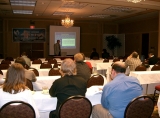
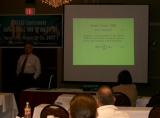
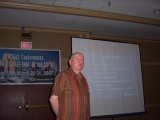
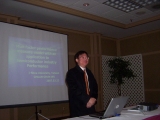
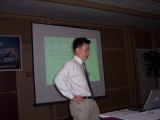
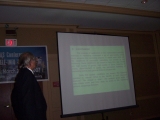
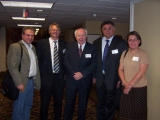





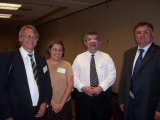
 Editors: Psarris and Jones, pages 200, price: 70 EUR
Editors: Psarris and Jones, pages 200, price: 70 EUR Editors: Psarris and Jones, pages 280, price: 80 EUR
Editors: Psarris and Jones, pages 280, price: 80 EUR